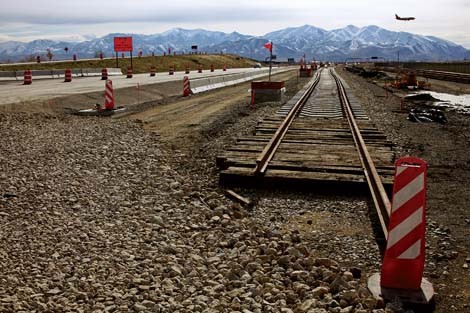Page 3 of 3

As a homeless North Temple prostitute, Felic Williams experienced a degree of desperation that struggling business owners on the same street can only imagine. She sold sex to johns on North Temple to feed her crack habit and considered herself lucky if a john left her a room for a night in one of North Temple’s seedy motels. The then 38-year-old charged between $40 and $60 per trick—averaging as many as 20 clients a night in the summer—to pay for crack cocaine she’d smoke in a public bathroom or on a street corner. She grew up in East Compton, Calif., where she started smoking weed at age 15 before turning to crack. When her mother, who lived in Ogden, died in 1992, Williams moved into her house. She has a lengthy criminal record, mostly for possession of drugs, and was sentenced to treatment three times by Utah district court judges. “Whatever this state seen in me, I didn’t see in myself,” she says flatly.
She lost two fully furnished apartments she had been renting along with all her possessions each time she relapsed and “unleashed the beast,” as she called crack. As her addiction grew worse, the one commodity she had to sell was sex. “I held myself higher [than those who employed violence to get drugs]. I was using what I had to, to get what I wanted.”
Once you “do it, it’s not that hard,” she says about prostitution. She learned “the stroll” and when men driving by would look over their shoulder at her, she would give the nod to “my date,” indicating where to park. She walked North Temple with a book bag, a purse, a toothbrush, condoms, her crack pipe and cigarettes. Being clean was important, even if her only access to washing was a restroom. “You can’t get steak prices looking like a hotdog,” she says.
After one relapse, a man picked her up and drove her to a hotel parking lot. While she was servicing him for $40, she thought, “Maybe this is what I am meant to do.” But one August night in 2009, as she watched a client smoke crack, “I could see my soul getting sucked up in that pipe. I was done.” Williams got a bed in The Haven rehab program and has been clean and sober for 20 months.
Bill Coker says the days of seeing a prostitute and a pimp who sometimes used to work Red Iguana’s parking lot are long gone. While “transient activity” on North Temple has noticeably diminished, he adds, the news in February that the Department of Corrections was considering opening a 300-bed facility for parole violators across from the Fair Park sent him into apoplexy. “Are you kidding me?” he says as he recalls his reaction.
Salt Lake City’s development director Gray, however, is optimistic the Department of Corrections won’t choose the “grand boulevard” as a location to warehouse parole violators. “I understand they are looking at alternatives,” he says.
Coker hopes for a future when North Temple is bursting “with coffee shops, boutique stores, interesting people doing interesting things.” Wilson, on the other hand, worries that the street she grew up on will become a blur in the window for light-rail commuters and tourists.
Encore’s Tsoufakis is sanguine as he stands outside his empty restaurant. “Whether we are here or not, [once the project is completed] it will be a better place to do business.”
A HELPING HAND
Out on North Temple, Howard's past is never very far away. Sometimes when he checks his company’s portable toilets, he finds a baggie with heroin residue presumably left by a passerby. “When I smell something like that, it doesn’t remind me of the early days, but rather all the grief I caused and felt,” he says.
The Haven’s manager Mike Ray says that in recovery, an addict can feel, “I have been a piece of shit all my life. If I help someone, I help myself.”
In 2010, Howard hired two women parolees from a halfway house just off North Temple to work as flaggers. Howard, who proudly wears his recovery on his sleeve, shared his story with them, but neither spoke of their own past with him. One went back to prison after a parole violation, but the other worked until Howard laid off many of his flaggers for the winter.
But as much as he wants to help, Howard’s efforts to transform North Temple inevitably displaces some who view the street as home. Several months before Howard closed down the Jordan River bridge adjacent to the Utah State Fairpark for reconstruction, he advised people living in the homeless camp below the bridge to find a new campsite. The group had set up traps and cages to catch fish, Howard says. “They had finally found a spot and as a group they looked out for each other.” He helped several move to new encampments and took food and water to a married couple who were the last to leave. “I thought my kindness was keeping them there,” he says.

Sitting outside The Haven one day, smoking, she felt “discouraged. I was giving up on myself.” In tears, she recalls The Haven’s Ray gave her some money as a down payment on “future work,” cleaning his and other people’s homes. “He showed me that someone cared about what happened to me.”
Now she is applying to the University of Utah to become a licensed substance-abuse counselor. The best counselors, she says, are those who have lived that life. Like Howard, she has her own tale of surviving North Temple to share. It’s a tale of a transformation that, much like the street she has left behind, still envelopes her.
“I’m a long way from North Temple,” she says. “Not real far away, but far enough.”